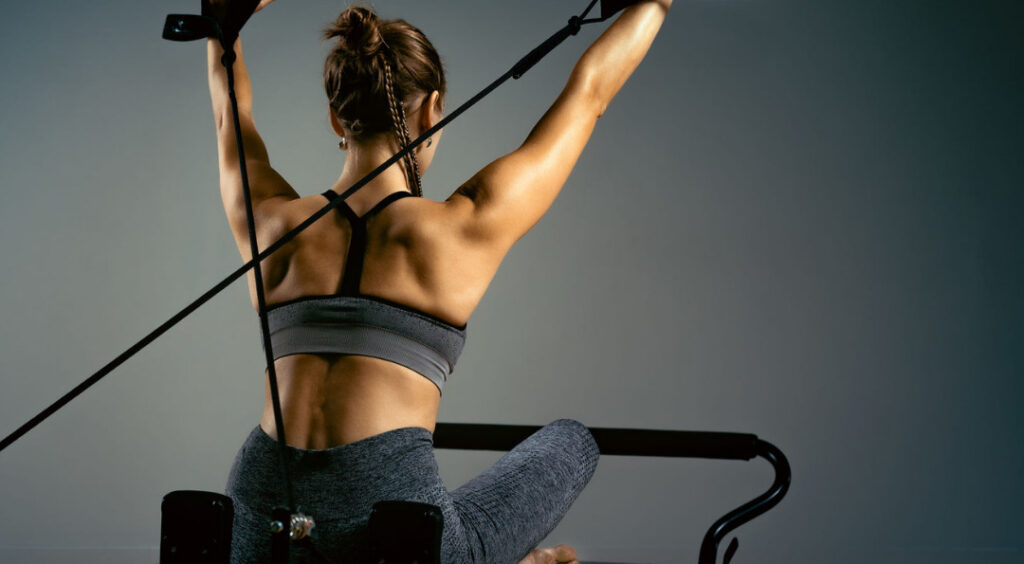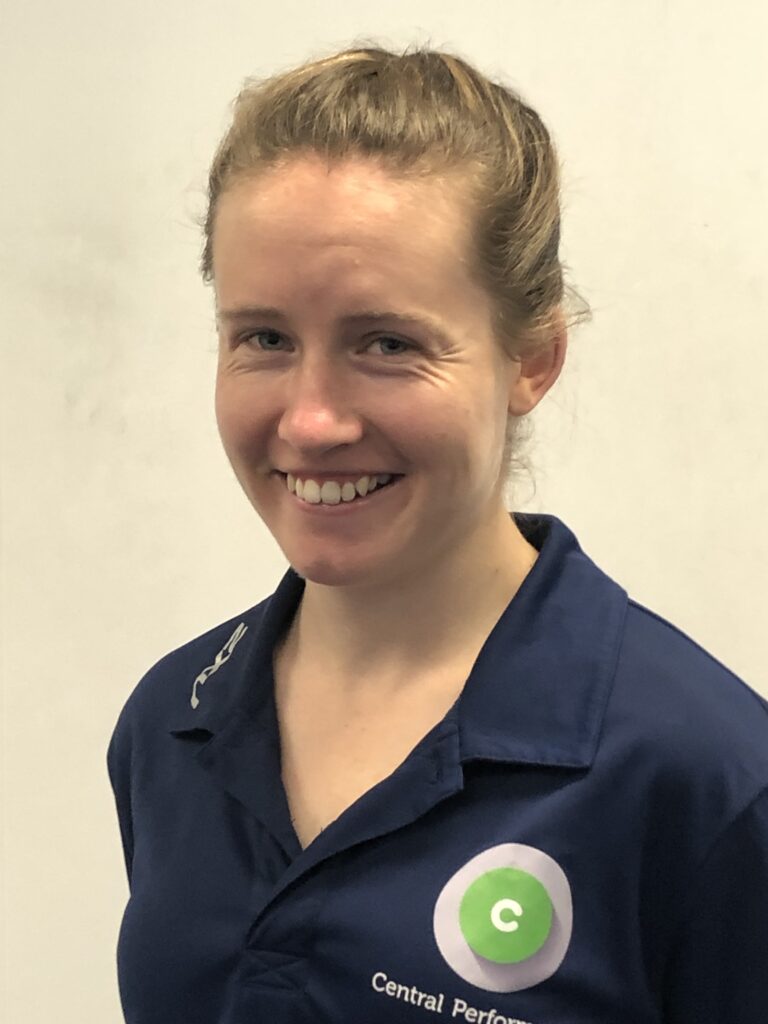
Do you have pain or tightness across your upper back, neck or shoulders after sitting at your work desk all day?
Or maybe some low back pain?
If yes then Pilates with a physio can help.
What Happens To Our Posture When We Sit At A Desk?
When we sit at a desk we tend to round our shoulders and poke our neck forwards. For short periods this is not really a problem, but when we do this for many hours each day, day after day, week after week and month after month, we can start to feel pain or tightness in a few areas.
Having this desk posture sustained for extended periods can build up patterns of tightness and weakness in certain areas. Our upper back (called our thoracic spine) can become more bent forward or hunched, and our shoulders can become more rounded. Our chest muscles and muscles on the front of our shoulder can become relatively tight while the muscles around our upper back and the back of our shoulders can become relatively weak and lengthened.
Posture And Desk Work: Posture Is Over-rated, Movement Is Under-rated
As well as taking regular breaks to change postures and positions, and having a good ergonomic setup, there are some exercises that we can do to help keep our muscles in good shape to manage this postural strain. It’s not that we have to be in a “perfect posture” all the time – in fact, research shows that often there is not a significant correlation between static posture and pain. But strengthening up our muscles can help us to maintain desk postures for longer without experiencing pain, tightness or stiffness. This increase in strength, coupled with getting into the habit of taking regular short breaks to avoid sustained sitting, can really help with relieving desk-related tightness and pain.
As well as exercising, we recommend that you move and change postures regularly to break up sustained sitting. Using a sit-to-stand desk is a great option. There has been a big shift towards sit-stand desks to encourage standing throughout the work day. A study showed a 66% decrease in sedentary time & a 54% decrease in neck & upper back pain when using sit-to-stand desks (Callaghan et al. 2015). Another great way to think about breaking up sustained sitting is to use the “5 and 55″ principle”. This means that within each hour of your work time, you should be spending 5 minutes up and about moving, being away from your desk. This could be going to grab a coffee or water, a quick walk around the block, or go and speak to someone rather than emailing them.
How Can Pilates Help Desk-Related Neck, Upper Back & Shoulder Pain?
Pilates can help by engaging and strengthening your upper back muscles. It is a great way of increasing the strength and endurance of these muscles as well as other spinal muscles and your core. This allows you to be able to sit for longer without fatiguing, which is a common cause of you feeling tight and achy across your mid/upper back, shoulders and neck.
As well as strengthening the upper back and shoulder muscles, Pilates can help improve the mobility of your upper back (thoracic spine). The combination of improving movement plus increasing strength means that you can sit for longer without getting sore, tight or stiff.
Four Pilates Exercises To Help With Sitting At A Desk
The four Clinical Pilates exercises shown in the videos below are a great way to begin using Pilates to help with tightness or pain in your spinal muscles, shoulder girdle, and right up into your neck. Try the exercises gently at first, working well within your fatigue levels, then increase reps as you feel comfortable.
Physio Pilates (Clinical Pilates) At Central Performance
If you would like to try Pilates then we have options to suit you at Central Performance. All of our instructors are experienced physiotherapists with advanced clinical Pilates certification. This means they are experts in assessing your current level of exercise ability, including any current injuries or niggles that will affect your Pilates program.
Once your initial clinical Pilates assessment is complete your physio will design a program that is personalised for your needs. Your program will include exercises specifically to
– help treat any injuries or pain that you currently have.
– if you have had recurrent/intermittent injuries or regular flare-ups of pain, for example back or neck pain that comes back a few times each year, then your program will target reductions in movement and/or strength that may be causing these regular pain episodes
– Pilates can be used as part of your post-operative rehab program. We regularly use clinical Pilates with clients as they recover from spinal surgery (back and neck pain, sciatica, discectomies, laminectomies, spinal fusions, scoliosis surgery etc…). This is one area where having a physiotherapist as your Pilates instructor is very beneficial, especially in the early stages after surgery
– as the saying goes, “you can’t go wrong getting strong!”. So your program will also include exercises to improve your all-round strength, core stability, movement control and co-ordination.
– mobility and range of movement are important for all-around physical ability as well as preventing injuries, so your program will include mobility exercises to ensure you have all the range you need to move with correct co-ordination and control
– Pilates is also great for improving your cardiovascular fitness, so the intensity of your program will be adjusted to make sure you begin at the right level and then gradually increase as you become fitter
– your program will also be personalised to achieve any other goals that you may have. These may include weight management, just getting confident getting back into exercise after having children or an extended break for whatever reason, and mental health reasons
Private (One-On-One) Sessions And Small Group Pilates Classes Are Available
Our physiotherapist-led clinical Pilates program provides options to suit you. All clients begin Pilates with us by doing some initial one-on-one (private) sessions. This is so that we can assess you, design your personalised program, and take you through your full program to make sure you are confident and comfortable doing the exercises with correct technique.
Some clients choose to stay doing one-on-one sessions, especially if they have a significant amount of pain, movement restriction, or simply prefer to have private sessions. For maximum convenience you can book private sessions whenever your physio instructor is available.
Other clients prefer to join our small-group clinical Pilates program. There are a maximum of four people in each class, so you still receive close supervision, guidance and technique correction from your physio. Classes are available before work and at lunchtime, and we also periodically adjust and add classes based on demand so we try to cater for your preferences.
An important distinction about our small-group Pilates program is that every client still does their own personalised program during the class. This sets the program apart from general gym Pilates programs, where a large group all do a generic program lead by a single instructor. The fact that every client still does a program that is tailor-made for them, plus the close supervision that having a maximum of four people in each class, means that your Pilates program is effective and safe, plus you have the confidence of knowing that you are doing every exercise correctly.
Group Pilates Plus Group Fitness Membership
As an added bonus, when you join our small-group clinical Pilates program you also get access to our full Group Fitness program. This gives gives you access to great group fitness classes to complement your Pilates program. Many clients join for Pilates initially, and after a while then try our group fitness classes. We use the same philosophy of small class sizes (max 6 people for these classes) and close supervision from degree-qualified coaches (physiotherapists or accredited exercise physiologists for our fitness program) to provide effective, safe and tailored programs for every client. Women-only sessions, called our HERo program, are also available. Ask your physio for more details
Sonja Murphy – Clinical Pilates Physio At Central Performance

My goal as a physiotherapist is to help my clients reach their full potential and live stronger, healthier lives through injury prevention, management, and performance advancement. Having completed my APPI Level 2 Matwork and Equipment (Reformer, Wunda Chair…) Pilates, I am interested in the role Pilates can have in optimising body movements to prevent future injury and pain. My clinical experience is in private practice, aged care, and with various sporting teams including the professional football club, Hearts of Midlothian in Edinburgh as part of their Academy Program. I have post graduate training in sports and kinesiology taping, as well as obtaining my Diploma in Sports Massage ITEC Level 3.
Sonja is happy to answer any questions you may have about how clinical Pilates with a physio can help you recover from injury, restore strength and movement to your body, and be an effective part of your all-round health and fitness program. For more information please feel free to call her on 9280 2322. You can also contact us online or email sonja@centralperformance.com.au. For online bookings, click here.

